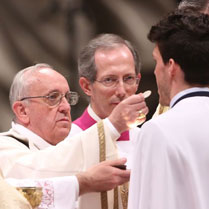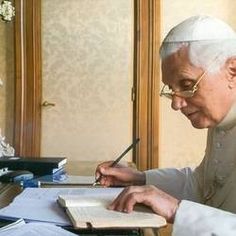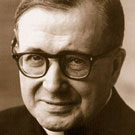Everybody’s favourite blogger (or mine, anyway), Max Lindenman, posted more confessional gold this week. I swear, the man has to publish his memoirs.
The title alone of his latest post commands attention: My First Grave Sin: A Christmas Story. However, I’ll just hone in on the ultimate paragraph:
Maybe in the hope of expiating the sin of that first, unworthy, Communion, I rarely commune at all now. Three or four times in a given year is a lot for me. If I can’t make a firm purpose of amendment, I don’t even bother — who would I be fooling? I suppose abstaining does keep me cut off from the primal, life-giving, genius-stoking stuff of Catholicism, but I get another facet of the Catholic experience in spades. That taste of cardboard was my first taste of unworthiness, and by extension, of Catholic guilt.
This raises a very interesting point. A moot point in my case, since I’m a priest, who is obliged to receive communion every time I say Mass. But that’s not true for most Catholics. The Church mandates the faithful receive communion once a year. For the rest of the time, the faithful are free to assist at Mass — which brings countless graces — while abstaining from communion.
The popular practice these days, of course, is to equate Mass with communion. Pope Pius X wished to see more Catholics receive communion more regularly. And why not? When we receive communion, it pleases our Lord. He wants us to approach him, to invite him into our lives, to enter into communion with him. Hence this advice from St Josemaría Escrivá:
He has stayed here for you. It is not reverence to omit going to Communion when well disposed. It’s irreverence only when you receive him unworthily.
But there is also a venerable tradition of “eucharistic fasting,” strong among the Fathers. Pope Benedict treats this in his Pilgrim Fellowship of Faith.
When Augustine felt his death approaching, he “excommunicated” himself and took upon himself ecclesiastical penitence. In his last days, he set himself alongside, in solidarity, with the public sinners who seek forgiveness and grace through the pain of not receiving Communion. He wanted to meet his Lord in the humility of those who hunger and thirst for righteousness, for Him, the righteous and gracious One.
I’m reminded of Simone Weil, who prayed daily in front of the tabernacle, but denied herself the sacraments — even baptism — partly in fear of committing idolatry (seeking the Church’s human consolations in place of God), but also in solidarity with the marginalised.
Ratzinger goes on. Apparently eucharistic fasting was once a common practice.
Probably since the time of the apostles, eucharistic fasting on Good Friday was a part of the Church’s spirituality of Communion. Not receiving Communion on one of the most holy days of the Church’s year, which was celebrated with no Mass and without any Communion of the faithful, was a particularly profound way of sharing in the Passion of the Lord: the sorrowing of the bride from whom the bridegroom has been taken away.
Aha! I’d have to consult the books on this one, but it’s conceivable that the priest himself might exercise eucharistic fasting on Good Friday, even while making communion available to the congregation. It could be a good catechetical point, fostering esteem and awe of the Real Presence, and solidarity with those outside communion.
With characteristic acuity, Ratzinger notes the necessary qualifications:
Such fasting — which could not be allowed to become arbitrary of course, but would have to be consonant with the spiritual guidance of the Church — could help people towards a deepening of their personal relation to the Lord in the Sacrament; it could be an act of solidarity with all who have a yearning for the Sacrament but cannot receive it . . .
. . I would not of course wish to suggest by this a return to some kind of Jansenism: in biological life, as in spiritual life, fasting presumes that eating is the normal thing to do. Yet from time to time we do need a cure for falling into mere habit and its dullness. Sometimes we need to be hungry — need bodily and spiritual hunger — so as once more to comprehend the Lord’s gifts and to understand the suffering of our brethren who are hungry.
Spiritual hunger, like bodily hunger, can be a vehicle of love.
H/T Joel.






What a thought-provoking post, Father John!
Good Friday is a good day to fast from Holy Communion. It used to be the norm pre V2.
But now, I’m on spiritual life support. But if I caught myself being lax and unrecollected (my spell check suggested uncollected!!!) after receiving the Lord, I could envisage going without Holy Communion as a penance.
Then again, what about going to confession more often if one is a daily communicant?
An excellent post as always John. I make it a point to engage in a Eucharistic fast during Lent that was inspired by the thoughts of then Cardinal Ratzinger. I have found it to be a most fruitful experience which makes me hunger more for Communion with our Risen Lord at Easter and to “so as to once more comprehend the Lord’s gifts ” God willing if I am Ordained a Priest I feel very attracted to a Eucharistic fast on Good Friday.
I kind of understand the idea behind abstaining from the Eucharist (really, just kind of). There’s an old woman I know who goes to the TLM who only receives every few months because of an “absence makes the heart grow fonder” kind of idea. Personally though I couldn’t imagine it.
Sometimes when I’m visiting family in the country I can only make it to Mass on Sundays and even then a week feels like forever, don’t know how anyone could abstain from Communion for months and maintain any sort of spiritual life. I don’t think I could.
Fr John, I commend you on this post. So well written and so informative. When I go after the Gospel, I do not receive Holy Communion and I feel so deprived because to receive Our Lord Jesus Christ in Holy Communion is such a privilege and the communicant receives tremendous graces. For sometime now, I make an extra effort to go early for Mass and my heart literally skips and leaps as I go to receive Jesus Christ in Holy Communion. It is such a joyous feeling – like a celebration. To receive Holy Communion is never dull or common place for me. It is always a very exciting time and a very exciting meeting with My Lord and Saviour. The days when I go after the gospel and I do not receive Holy Communion, I feel such a void in my heart. I feel like I have failed to meet the One that I love so much and especially when this One is waiting to meet me.
What really pains me now is that people who are divorced and remarried either by law or in Christian churches yearn to receive Holy Communion because I am aware that they do feel a void in their hearts and they think that by receiving Holy Communion, that the void would be filled. Now, I do not want to be a judge and judge these people but I feel that it would be better if these people go for confession and do their best to live a good life and when it comes to receiving Holy Communion to be honest with themselves and not receive Holy Communion. I do understand their desire to received Holy Communion but to receive Our Lord Jesus Christ unworthily is terrible thing to do -to Jesus Christ and to themselves. I am aware that the Catholic Church is now in a dilemma regarding this subject but I hope and pray that they will listen intently to what the Holy Spirit is saying and act accordingly. I also think that we all need to pray and listen to the Holy Spirit.
Yeah, I’m with you Jake. I mean, Lent’s an awfully long time Mark. No alcohol is one thing, but no communion? My spiritual fervour and apostolic zeal are ausceptible at the best of times.
Apart from that, to quote St Josemaría (again!):
To abstain from communion as an act penance may well mortify me personally, but it mortifies our Lord too. Why deprive him of the joy of communion? We go for his sake as much as our own, surely?
All that said, it’s nuanced, but I think it is a different matter to fast for the sake of the feast, or to abstain in an act of solidarity.
I think you’re on to something with frequent confession MuMu.
Florence, you might be interested to know that in his discussion on eucharistic fasting, Ratzinger explicitly refers to the pastoral dilemma posed by divorced and remarried Catholics. It’s worth reading in whole: Pilgrim Fellowship of Faith, pp. 86-89.
I should clarify my position on Eucharistic fasting. I did not make it clear. I do not fast during the whole of Lent but as I usually attend Mass 2-4 times a week I will fast at least once in any given week. I agree that to abstain from the whole of Lent is not advisable.
Nice. Makes me feel less slack about my humbler privations. 🙂
Fr John you are one of the most humble Priest I know I could do well to try follow your example
Abstaining from Communion, apart from when having sinned, is a notion I’ve heard of, but never taken seriously. I now see that it is undertaken by some for edifying reasons. And perhaps because it is not in my experience, I have a misgiving. The idea of abstaining from such a grace in order to be graced in return is strange. I know that often we don’t yearn for the sacrament, we are unthinking and insufficiently mindful of this unspeakable mystery. That is one problem, and needs to be dealt with. But perhaps abstaining is not the way to go about it.
I just read a quote of Aquinas related to this point the other day. He touches on both the right intention that must be behind frequent communion and the fruits of the practice.
When I read what he said on the matter of right intention, I had to examen myself and my past. Like St Paul, I dare not judge myself, but I honestly believe I have been more free of the malaise of routine or vainglory in approaching daily Communion than I had possibly been previously when I received only on Sundays. The frequent confessions and daily prayer that have accompanied my daily Communion obviously play their part, but I think the actual reception of the Blessed Sacrament daily has been the greatest preparation for it. In other words, receiving Christ frequently has made me better prepared to receive him at all. I suppose the paradigm is of a little child being fed daily by his mother. The child is always in need of his mother.
I think that the reception of Holy Communion when meeting all the requirements is “a healing remedy” as it says in one of the prayers of Mass in the EF. Therefore, weak and sinful as we are, so long as we are truly repentant and trying to avoid all sin, we need the strength which Christ gives us in the Blessed Eucharist. I do not believe that we should stay away from such healing help to expiate past sins which we have recognised and confessed and done the required penance; that would imply that sin is not wiped away in the Sacrament of Penance.
The seminary taught me 44 years ago that the sacraments are offered “pro hominids“, meaning that there should not be undue restrictions. The Church rightly identifies her restrictions. Without disrespecting personal devotion, each of us should be wary about imposing demands on ourselves more restrictive than those of the Church.
I find separation from Our Lord in Holy Communion is a great loss for me, I need His presence, His union One in me and I one in Him.Arbitrary abstinence from contact with one you love is to me unthinkable. Circumstances might prevent us, even regularly, but the desire for Communion with Him compels.
I’m aware that the church unites seeming contradictions in a number of matters (immanence/transcendence, free will/providence, and many more). I wonder – if we are only obliged to receive once a year (and from memory I think in these cases it should be in the Easter season), how is this united with the concept of abstaining from receiving through Lent?
I quite like the idea of abstaining to “build up” true appreciation of receiving the Blessed Sacrament, but I do wish to receive daily if I could. Frequent reception is encouraged but not mandatory and I associate with the mother/baby analogy used earlier. This being the case, I can see the benefits of both.
Regarding the intriguing idea of a priest abstaining from receiving Holy Communion on Good Friday, the is nothing in canon law stating that the priest must receive at the Good Friday liturgy, and as yet I have not been able to find anywhere in the GIRM that it is required. So I would say that it is possible, but because it is possible does that mean it should be done?
Interesting post, thanks for the stimulating thoughts.
A fine discussion thread, Fr. John! There’s an interest in making distinctions. No issue of legalism. Rather an interest in understanding the Church’s doctrine and liturgy. That indicates a love of the Church. Re the matter of Good Friday and the priest’s communion, our missal states at 27 that “(the priest) reverently consumes the Body of Christ”. Whatever of the laity’s devotion in abstaining on that day, it isn’t an option for the priest.
I try to receive Holy Communion as much as I can. My recent illness meant that I was unable to go to Mass and received Holy Communion only once a week. I really felt the separation from my Lord. Holy Communion is one of the greatest graces we have been given and it is a time when we come in union, become one with Jesus. I can’t imagine denying myself that grace unless I knew I had to go to Confession.
Our union with the Lord through the Eucharist nourishes, nurtures and strengthens us in our spiritual journey. It is also a source of healing from desolation, doubt and fear. The danger of fasting is that unless one is spiritually strong, there is a real risk of drifting away and losing the meaning why we come need to in union with Christ. A mentality of ‘I don’t need Jesus’ can arise and one can believe you can journey alone. I understand the denial of receiving Holy Communion is a sacrifice….as long it is done with humility not with pride.
Ditto Fr Chris, some good discussion.
Without daring to judge any one individual, as a collective I think there are most certainly too many people receiving communion too often. Long lines for communion, short ones for confession and all that. Pastorally a tough one to address.
I find pews a massive problem in exercising this practice. I reckon churches should have half a dozen or so pews near the front for the elderly and for devotional prayers outside of mass but open space the rest. Old school. That’s another thing people do too often in churches – sit down.
With the average age of people attending Mass at the moment, you’d be better off removing six pews at the back for young people to stand and leaving the rest for the elderly!
Nice one Bucky.
When I was younger I tried the whole abstaining from communion thing. My spiritual director, however, strongly recommended against it and after consideration I agree with his reasoning.
We are fallen and will never have a perfect disposition to receive Our Lord. Indeed, if it was up to us we would never be worthy to receive. Our Lord himself makes us worthy. Now of course, there are certainly times when we make ourselves especially unworthy and I agree with Joel’s point wholeheartedly, but for those people who are in a state of grace I think they should take every opportunity to receive Our Lord.
Regardless, I certainly think that the decision to abstain from communion should ONLY be made after consulting a spiritual director.
This is ridiculous and is very dangerous. After reading this article, two of our parishioners have suggested missing Sunday Mass in solidarity with those who no longer go to Mass. Absurd, of course. It is just like “going on strike”………very dangerous.